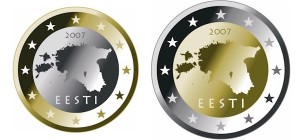
Both the IMF and Germany say they expect Estonia qualify for eurozone accession in 2011 before either of the other Baltic states.
TALLINN — Journalist Mike Collier sat down with Andres Lipstok, governor of the Estonian Central Bank, this week in an exclusive interview for Baltic Reports to ask about how the country’s path to the eurozone is faring in the crisis.
Baltic Reports: How do you see the timetable for euro adoption panning out?
Lipstok: I think that we will meet the inflation criteria this year and the criteria will be fulfilled early next year.
BR: The IMF suggested keeping to the 3 percent of gross domestic product deficit threshold demanded by the Maastricht criteria could be tricky next year.
Lipstok: By our forecast the deficit will be 2.9 percent, under the 3 percent limit and of course its sustainability must be checked very carefully in the future. The finance ministry and the Bank of Estonia accept all these proposals from the IMF mission.
Of course it’s necessary to have some kind of reserves so as the minister of finance explained, they understand that they must be ready to present some kind of reserves and we hope that the minister of finance will organize those reserves.
BR: How will Estonia’s adoption of the euro impact the other Baltic states?
Lipstok: All three Baltic states are different and have their own story. We are ready to enter in 2011, but it’s difficult for me to comment on Latvian and Lithuanian plans.
BR: Do you think the decision to peg the kroon absolutely [without a fluctuation band] has been particularly useful?
Lipstok: It was the right decision seventeen years ago when we started. We have presented this fixed exchange rate quite clearly and I think the fixed exchange rate helped us a lot. Our economy is quite understandable to everybody and we are ready to continue with this fixed exchange rate to join the euro area. It’s very understandable to all our partners and investors.
BR: Might you be tempted to tinker with the rate when and if you get euro approval, to give a boost to Estonian competitiveness?
Lipstok: I think that our 15.665 is the right rate and nobody has said there’s anything wrong with that. We are quite clear that we will join with this official rate. Our competitiveness is quite high, we don’t need any additional boost.
BR: Is there a danger that having got the euro, you become less focused?
Lipstok: Sustainability is the word. We need a sustainable growth rate and the euro will help us achieve that. That will be the new target when the euro is adopted.
BR: A lot of people are facing tough times at the moment — do they think the euro is as important as you do?
Lipstok: Our public is quite positive about euro adoption and the euro adoption target. Our social polls show that more than fifty percent of people support euro adoption. Everybody understands that the euro is our biggest challenge to restore our sustainable economy.
It will be a useful tool for investment because the euro area is quite understandable. When we adopt the euro our organizations will be on the same level as the whole euro area and investor confidence will increase.
BR: Anything you will miss about having krooni in your pocket?
Lipstok: [laughs] No.
Mike Collier is a freelance journalist operating out of Riga. His professional website can be found here.












